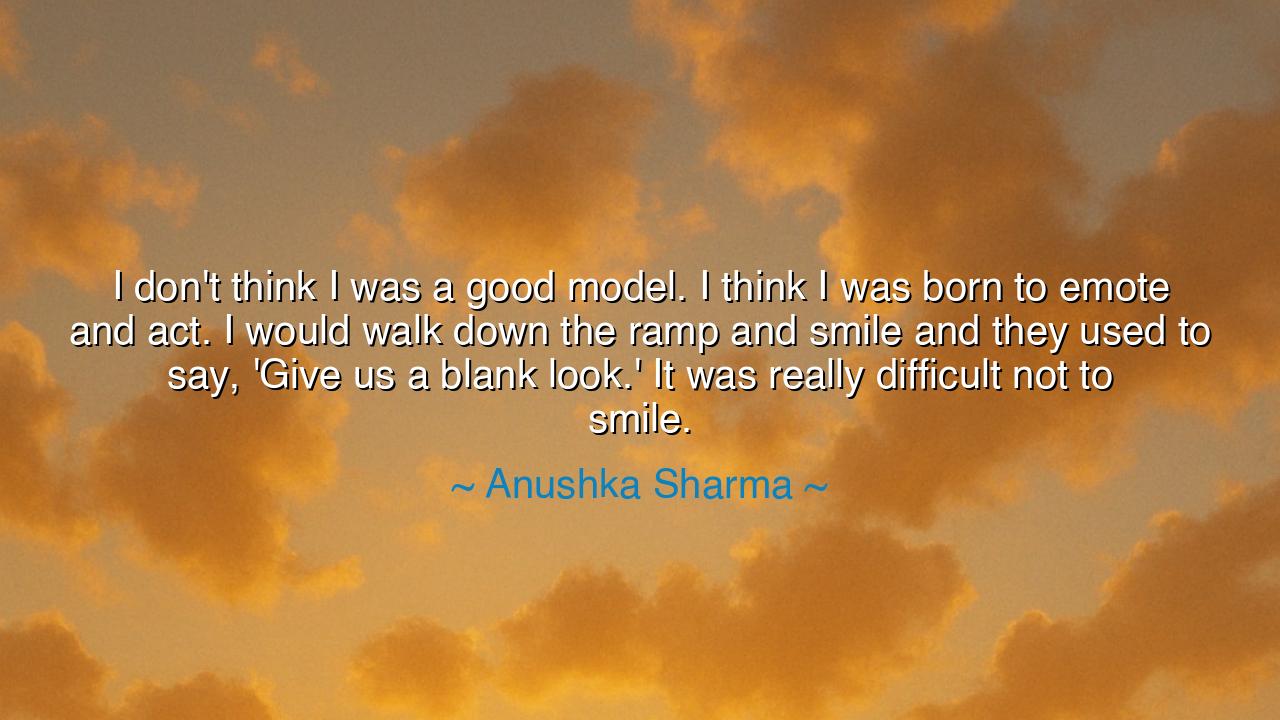
I don't think I was a good model. I think I was born to emote and
I don't think I was a good model. I think I was born to emote and act. I would walk down the ramp and smile and they used to say, 'Give us a blank look.' It was really difficult not to smile.






The words of Anushka Sharma shine with candor and a gentle defiance of expectation: “I don't think I was a good model. I think I was born to emote and act. I would walk down the ramp and smile and they used to say, 'Give us a blank look.' It was really difficult not to smile.” At first, they speak of the world of modeling and performance, yet beneath them lies a deeper truth about the human soul—the refusal to suppress authenticity for the sake of convention, and the power of emotion when it is allowed to flow freely.
The demand for a blank look is not unique to fashion—it is a demand that life often makes upon us. Society asks us to hide, to wear masks of neutrality, to silence the radiance of our emotions. Yet Sharma confesses that such concealment was alien to her nature. Her instinct was to smile, to let joy and warmth spill forth even when instructed to withhold it. This tension between the blankness expected and the vibrancy within her reveals the eternal struggle between conformity and authenticity.
To say she was “born to emote and act” is to claim her destiny not in silence, but in expression. Acting is the art of giving life to feeling, of making visible the invisible currents of the heart. For some, blankness can be powerful; for others, it is suffocating. Anushka’s words remind us that each soul has its own gift, and that forcing it into an ill-fitting mold is not mastery but diminishment. Her struggle on the ramp was not failure, but a signpost pointing her toward her true calling.
History offers us many echoes of this truth. Consider the life of Charlie Chaplin, who in an age of silent film, when actors often emphasized stillness and restraint, filled the screen with exaggerated emotion, laughter, and tears. Critics said he broke the conventions of his craft, yet it was precisely his refusal to remain blank that made him timeless. In the same way, Sharma’s inability to mute her smile revealed not weakness, but destiny—the call to a field where emotion is not suppressed but celebrated.
The smile, then, becomes a symbol of authenticity. It is not simply an expression of joy, but an assertion of truth: this is who I am, and I will not easily hide it. To resist the command to blankness is to resist the diminishment of the soul. It is a declaration that one’s truest power lies not in concealment but in expression, not in silence but in voice, not in neutrality but in passion.
The lesson here is profound: each person must discover whether they were meant to be blank or to shine, to restrain or to emote. The world may demand one thing, but the spirit demands another. To follow the spirit is to live with authenticity, and in that authenticity lies greatness. Anushka Sharma teaches us that failure in one role may be proof of destiny in another, and that what feels unnatural is often the sign that we are meant to walk a different path.
Therefore, let us act with courage. Do not force your soul into forms that do not fit. If you are called to smile, then smile—even when the world demands blankness. If you are born to emote, then act with all the power of your heart. For it is only when we honor the truth of who we are that we rise to our fullest strength.
Carry forward this wisdom: “It was really difficult not to smile.” Let it remind you that authenticity is not always easy, but it is always noble. And may it guide you to choose expression over suppression, joy over blankness, and destiny over conformity—for in such choices, the soul becomes radiant, and the world is transformed.






AAdministratorAdministrator
Welcome, honored guests. Please leave a comment, we will respond soon